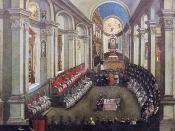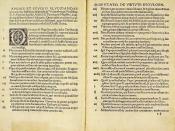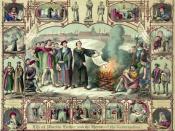In the second decade of the sixteenth century, a powerful movement known as the Protestant reformation began in northern Germany. This movement was born out of widespread discontent with the reigning Catholic church. Though initially slow to respond to the challenges of the reformation, the Catholic church eventually responded in a vigorous manner to the threats of spreading Protestantism.
The Protestant reformation began in 1517 when Martin Luther posted his ninety-five theses on the door the castle church in Wittenberg. Luther was an Augustinian monk and a professor at the University of Wittenberg, where he studied the bible intensely. Luther's main area of study was salvation and how it is achieved. Through his studies, he came to the conclusion that "good works do not make the sinner acceptable to God, but rather God's acceptance of the sinner prompts goods works." This concept of salvation by faith alone was contradictory to the Catholic doctrine, which stated that sacramental acts and charitable deeds were instrumental to insure one's salvation.
Luther also dismissed the idea that the pope was God's authority on earth and rejected all papal authority. In 1515, a Dominican monk named John Tetzel was sent to Germany to sell indulgences. This infuriated Luther, who spoke out in his sermons against the sale of indulgences and purchasing release from purgatory. The abuse of indulgences acted as a catalyst and prompted Luther to post his ninety-five theses, an event that would spark changes in Christianity across Europe and lead to many years of reform.
Within weeks of posting his theses in Wittenberg, Luther's work had been reproduced and was being read throughout the Holy Roman Empire. The printing press was a relatively new invention at the time and no one was prepared for how quickly Luther's ideas would spread. The Catholic church...



The English Reformation
The Author really does not grab the readers attention with his/hers introduction.
0 out of 0 people found this comment useful.